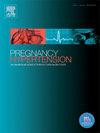Association of genetic ancestry with pre-eclampsia in multi-ethnic cohorts of pregnant women
IF 2.9
4区 医学
Q2 OBSTETRICS & GYNECOLOGY
Pregnancy Hypertension-An International Journal of Womens Cardiovascular Health
Pub Date : 2024-10-04
DOI:10.1016/j.preghy.2024.101162
引用次数: 0
Abstract
Objectives
Maternal self-reported ethnicity is recognised as a risk factor for pre-eclampsia in clinical screening tools and models. This study investigated whether ethnicity is acting as a proxy for genetic variants in this context.
Study design
A total of 436 women from multi-ethnic backgrounds recruited to two UK observational pregnancy hypertension cohort studies were genotyped. Genetically-computed individual ancestry estimates were calculated for each individual through comparison to the multi-ethnic 1000 Genomes reference panel genotypes. Regression models for pre-eclampsia using clinical risk factors including self-reported ethnicity with and without ancestry estimates were built and compared using Likelihood Ratio Tests (LRT).
Main outcome measures
Pre-eclampsia (early- and late-onset).
Results
In these multi-ethnic cohorts (mean age 34.9 years; 41.3 % White, 34.2 % Black, 13.1 % Asian ethnic backgrounds; 82.6 % chronic hypertension), discrepancies between self-reported ethnicity and genetically-computed individual ancestry estimates were present in all ethnic groups, particularly minority groups. Genetically-computed pan-African ancestry percentage was associated with early-onset (< 34 weeks) pre-eclampsia in adjusted models (aOR 100 % vs 0 % African ancestry: 3.81, 95 % CI 1.04–14.14, p-value 0.044) independently of self-reported ethnicity and established clinical risk factors. Addition of genetically-computed African ancestry to a clinical risk factor model including self-reported ethnicity, improved model fit (Likelihood ratio test p-value 0.023).
Conclusions
Self-reported maternal ethnicity is an imperfect proxy for genetically-computed individual ancestry estimates, particularly in ethnic minority groups. Genetically-computed African ancestry percentage was associated with early-onset pre-eclampsia independently of self-reported maternal ethnicity. Well-powered studies in multi-ethnic cohorts are required to delineate the genetic contribution to pre-eclampsia.
多种族孕妇队列中遗传血统与先兆子痫的关系。
目的:在临床筛查工具和模型中,产妇自我报告的种族被认为是子痫前期的一个风险因素。本研究调查了在这种情况下,种族是否作为遗传变异的替代:研究设计:对英国两项妊娠高血压观察性队列研究中招募的 436 名多种族背景妇女进行了基因分型。通过与多种族 1000 基因组参考面板基因型进行比较,计算出每个人的基因计算个体祖先估计值。利用临床风险因素(包括自我报告的种族)和祖先估计值建立子痫前期回归模型,并使用似然比检验(LRT)进行比较:主要结果指标:子痫前期(早发和晚发):在这些多种族队列中(平均年龄 34.9 岁;41.3% 为白人,34.2% 为黑人,13.1% 为亚洲人;82.6% 为慢性高血压患者),所有种族群体,尤其是少数民族群体的自我报告种族和基因计算的个体祖先估计值之间都存在差异。在调整模型中,经基因计算的泛非血统百分比与早发(< 34 周)子痫前期相关(非洲血统 100% vs 0%:3.81,95% CI 1.04-14.14,p 值 0.044),与自我报告的种族和已确定的临床风险因素无关。在临床风险因素模型(包括自我报告的种族)中加入经基因计算的非洲血统,可提高模型的拟合度(似然比检验 p 值为 0.023):结论:自我报告的母亲种族并不能完全代表基因计算的个体祖先估计值,尤其是在少数民族群体中。基因计算得出的非洲血统百分比与早发性子痫前期有关,而与自我报告的产妇种族无关。要确定先兆子痫的遗传因素,需要在多种族队列中进行有力的研究。
本文章由计算机程序翻译,如有差异,请以英文原文为准。
求助全文
约1分钟内获得全文
求助全文
来源期刊

Pregnancy Hypertension-An International Journal of Womens Cardiovascular Health
OBSTETRICS & GYNECOLOGYPERIPHERAL VASCULAR-PERIPHERAL VASCULAR DISEASE
CiteScore
4.90
自引率
0.00%
发文量
127
期刊介绍:
Pregnancy Hypertension: An International Journal of Women''s Cardiovascular Health aims to stimulate research in the field of hypertension in pregnancy, disseminate the useful results of such research, and advance education in the field.
We publish articles pertaining to human and animal blood pressure during gestation, hypertension during gestation including physiology of circulatory control, pathophysiology, methodology, therapy or any other material relevant to the relationship between elevated blood pressure and pregnancy. The subtitle reflects the wider aspects of studying hypertension in pregnancy thus we also publish articles on in utero programming, nutrition, long term effects of hypertension in pregnancy on cardiovascular health and other research that helps our understanding of the etiology or consequences of hypertension in pregnancy. Case reports are not published unless of exceptional/outstanding importance to the field.
 求助内容:
求助内容: 应助结果提醒方式:
应助结果提醒方式:


